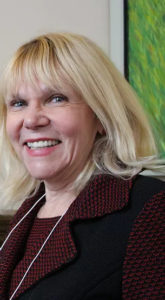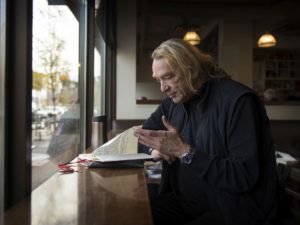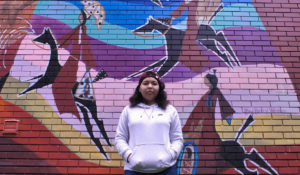Helen McPhaden is the Executive Director of the Stardale Women’s Group. She began this group for Indigenous women in Saskatchewan over twenty-five years ago. Seventeen years ago, she moved the program to Calgary and shifted the focus to urban aboriginal girls. Helen and I were both regulars at Caffè Beano and eight years ago she casually suggested I come in and work with the girls on some writing projects she had in mind.
In introducing me first to the girls and then to audiences at our performances, Helen lists as one of my credentials the fact that I grew up in, according to Macleans magazine, Canada’s worst neighbourhood. And it’s true. I did. It is an area fraught with racial tension, mostly the white settlers in conflict with First Nations people. That was at least one way to explain the presence of a male, and a white one at that, at a women’s organization that runs programs for Indigenous girls.
But I had worked with First Nations people in several capacities over the years – editing a book of First Nations art and poetry in Toronto in the ‘80s, co-creating a theatre company for Indigenous and white people in Regina in the ‘80s and teaching at what is now the First Nations University in the ’90s.
The first project Helen devised for me to work with the girls on was a piece about youth suicide in First Nations communities. Imagine, talking to a group of girls, some as young as 11 years, about suicide – including preferred techniques. This led to an examination of cutting – cutting the skin with a sharp knife to “feel something, at least” as one girl put it. And hearing the harrowing story of a 14-year-old girl rushing across the city by bus to discover the body of a friend swaying at the end of a rope in his bedroom.
We did two versions of that piece which we called “Committing,” as in committing suicide. The girls (some of them) were remarkably forthright in their contributions to the script and took part in performances with a great degree of professionalism and even enthusiasm. Does this mean they are inured to the concept or even the reality of suicide among their young peer group? Or is it an incredible feat of courage that allows them to cast a cold eye on death and move on?
Sadly, I think it is a bit of both. Many of the girls in the program come from reduced circumstances and limited opportunities. They may be raised in homes where this is alcoholism, drug use, promiscuous behaviour, and on and on. Even to say they are raised in such homes is a bit of a misnomer – quite often we discover that girls in the program essentially function in the role of a parent in their homes, doing the cooking, cleaning, even paying the bills in some cases. They have been dealt a tough hand to play. Obviously, it takes a tremendous amount of courage and determination to survive these circumstances, let alone rise above it all. The Stardale Model programming provides not only strategies and life skills for this precarious journey, but also the moral support and encouragement we all need but that they seldom receive.
After we had completed both versions of the Committing project, Helen and I expected there would be a lot of interest in the various Indigenous communities throughout and around Calgary to see the work and hopefully use it as a springboard to foster an open discussion about the youth suicide crisis. Sadly, much to our surprise, that never happened.
We followed that project up with another, “The Make Believer Project”. This was another live performance written and performed by the girls. The piece was by and large a reaction to the opioid crisis among the First Nations in southern Alberta. We had the opportunity to perform this piece a number of times throughout Calgary. Audiences were impressed with the girls’ courage and strength in the face of this crisis, which has largely been swept under the carpet due to our ongoing obsession with Covid-19.
In 2019, Helen engaged me again as an artist in residence at Stardale to create our most ambitious piece yet, The Road, which was to be a reaction to the findings of the Missing and Murdered Indigenous Women inquiry. This began in the same way as the other projects, as a script made for live stage performance. The goal when I started working with the girls in January 2020 was to create a script to be performed at a fundraiser last May. At the same time, we had engaged a young filmmaker, Vanessa Wenzel, to create an adjunct film to complement the stage play. As it turned out, thank God we had! Vanessa was able to take the script I had created from the girls’ own words and turn it into a film – an award-winning film at that.
In speaking of the courage these girls show in their day-to-day lives, I felt we got to a new place in The Road, and that was anger. Obviously, for the most part, anger is a negative emotion usually with detrimental outcomes. Certainly, we admire the courage the Stardale girls demonstrate in their lives, day in, day out. But surely there must come a time when courage doesn’t just mean forbearance. There must come a time where courage means asking some hard questions and demanding change, and sometimes you need anger to get you there.
“What happened to our mothers?” one girl had the courage to ask. And again, “Were they murdered or are they missing?!” They were asked with a certain anger and urgency. The girls, like all Indigenous peoples, are tired of not having their questions answered, let alone any meaningful action taken. Who can blame them?
Courage comes in different sizes and shapes and it can be found in some unlikely places. It abounds in these young Indigenous girls of the Stardale program and my admiration and respect for them is immense. I have found Stardale an inspiring place to work on these various projects. I believe the work we create can inspire others as well.
All photos courtesy of Stardale Women’s Group and Eugene Stickland.
For more information about Stardale Women’s Group, visit www.stardale.org
THE ROAD (2020) is a short film starring the young Indigenous women of Stardale Women’s Group. It has won awards at both the Montreal Independent Film Festival (2020) and the Canada Shorts Film Festival (2020), and is an Official Selection at the 2021 Vancouver Independent Film Festival. To watch the film, visit www.theroadfilm.ca All proceeds from the $10 rental fee go to the Stardale Women’s Group programs.










